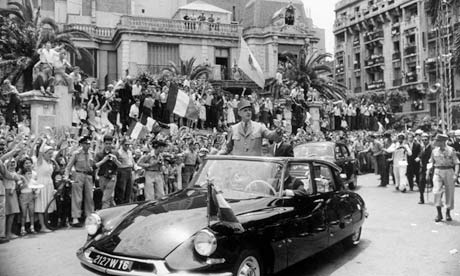Part 1: The Debate in Every Person: to Have More Feeling or Less?
Part
2: A Feeling for People When It Was Needed Most![]()
Part
3: The Desire to Have Good Will Makes for More Feeling
|
Beginning in 1938, the Nazis moved through Europe, grabbing Czechoslovakia, sweeping through Poland, then Norway, Denmark, Holland, Belgium and finally France, where in just a matter of weeks the French defenses crumbled. Only the armored division under the command of De Gaulle showed any meaningful resistance. Elevated to a cabinet position, De Gaulle passionately argued that the government be moved to French Algeria to continue the fight. There were also negotiations he was part of, for a possible merger with England, when the French government, in the town of Vichy, secretly negotiated an armistice with Germany, in actuality, a surrender. Imagine the feeling of Frenchmen as the land of Joan of Arc, Napoleon, Balzac, Victor Hugo, was literally handed over to the Fascists. For Charles De Gaulle, this was unthinkable. After arranging escape from France for his wife and children, he himself just managed to make it to England. On a sunny June afternoon, 1940 this mostly unknown two-star French General appeared at 10 Downing Street and was greeted warmly by Prime Minister Winston Churchill. Churchill arranged for De Gaulle to speak to his defeated nation via the BBC. In The Right Of, Mr. Siegel wrote, "The emotion...which all people hope for arises from one's having been honest about the world." That night French men and women heard De Gaulle say:
For the next months and years, he worked to establish the Free French as a fighting force, and they contributed importantly to the victory over the Nazis in North Africa. He had to fight for respect from Churchill whom he felt looked down on his defeated country, and wasn't happy that De Gaulle was friendly to the Soviet Union. De Gaulle had a big feeling about how the Red Army fought the Nazis, and memorized all the aspects of the Battle of Stalingrad, that great battle in the fall and winter of 1942 and 43', which most people still do not know, was the turning point of the war. In four years under the Nazis, thousands of French were executed, hundreds of thousands of French Jews were sent to concentration camps. So imagine the feeling that day in late August, 1944 as De Gaulle's top unit--the 2nd Armored Division of Brigadier Jacques Leclerc--which had fought all the way from central Africa, entered Paris, routing the last Nazi holdouts; and then the following day as De Gaulle himself walked with the people of Paris to the Arc de Triomphe. Writes biographer Stanley Clark:
 More than two
million
people were in the streets, and for once there was a trace of pride in
the way in which De Gaulle looked over that sea of eager faces and
reached out as if to grasp all the millions of hands stretched out in
gratitude
towards him. More than two
million
people were in the streets, and for once there was a trace of pride in
the way in which De Gaulle looked over that sea of eager faces and
reached out as if to grasp all the millions of hands stretched out in
gratitude
towards him. Is More Feeling Tough or Weak? In the Aesthetic Realism lesson I've been quoting from, Mr. Siegel said:
|
|
|